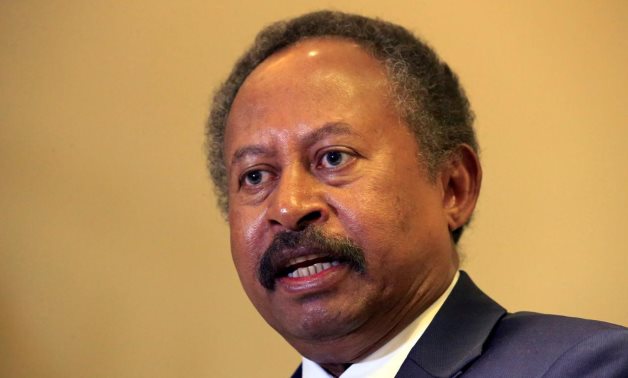
FILE PHOTO: Sudan's new Prime Minister in the transitional government Abdalla Hamdok, speaks during a Reuters interview in Khartoum, Sudan August 24, 2019. REUTERS/Mohamed Nureldin Abdallah/File Photo
CAIRO – 23 November 2020: Sudanese Prime Minister Abdullah Hamdok stated that the Grand Ethiopian Renaissance Dam (GERD) directly affects his country asserting that it must not be operated until an agreement is reached, as reported by Al Arabiyah.
The Sudanese Ministry of Irrigation and Water Resources had earlier declared it would not take part in the ministerial meeting held on GERD on November 21. On the other hand, the foreign and irrigation ministers took part in the meeting held under the auspices of the African Union (AU). Yet, no outcome was announced.
The Egyptian Ministry of Water Resources said in a statement on November 4 that the Egyptian, Sudanese and Ethiopian sides have not reached an agreement on a methodology for completing negotiations on GERD.
This came as the water resources ministers of the three countries met on Wednesday to find an ideal framework for GERD talks, under the auspices of the African Union.
The three sides have agreed to submit a report each to South Africa, as the current chair of the Union, which includes the course of the meetings and the vision around ways to implement the outcome of the Bureau of the AU’s Assembly meetings on June 26 and July 21.
Those two meetings have required the three countries to reach a binding legal agreement on filling and operating the massive dam.
The dispute between Egypt, Sudan, and Ethiopia dates back to May 2011 when Ethiopia started building the dam; Egypt voiced concern over its water share [55.5 billion cubic meters].
Three years later, a series of tripartite talks between the two countries along with Sudan began to reach an agreement, while Ethiopia continued the dam construction.
In 2015, the three countries signed the Declaration of Principles, per which the downstream countries should not be negatively affected by the construction of the dam.
In October 2019, Egypt blamed Addis Ababa for hindering a final agreement concerning a technical problem, calling for activating Article No. 10 of the Declaration of Principles, which stipulates that if the three countries could not find a solution to these disputes, they have to ask for mediation.
Washington had brokered a tripartite discussion between the three countries, in presence of the President of the World Bank (WB) starting from November 6, 2019 until February 27 and 28, 2020 when Ethiopia apologized for being absent from the negotiations.
During these rounds of talks, tangible outcomes were agreed on among the three parties concerning the rules and mechanism of operating the dam and the filling process of the reservoir during the drought and prolonged drought; however, the Ethiopian and Sudanese refused to sign the US/WB-drafted deal.
Constructions in the Grand Renaissance Dam started on April 2, 2011 at a cost of $4.8 billion. It was built by the Italian construction and engineering company Salini Impergilo. The Italian company is headquartered in Milan. The dam is located on the Blue Nile with a capacity of 74 billion cubic meters, and is expected to generate up to 6,000 megawatts of power.
Comments
Leave a Comment